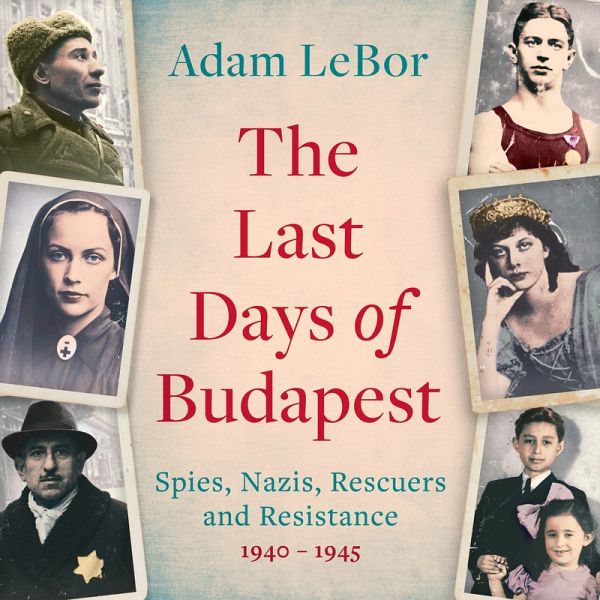
The Last Days of Budapest (MP3-Download)
Spies, Nazis, Rescuers and Resistance, 1940–1945 Ungekürzte Lesung. 1061 Min.
Sprecher: Thorpe, David

PAYBACK Punkte
9 °P sammeln!
Bloomsbury presents The Last Days of Budapest by Adam LeBor, read by David Thorpe. Budapest, autumn 1943. Four years into the war, Hungary is allied with Nazi Germany and the Hungarian capital is the Casablanca of central Europe. The city swirls with intrigue and betrayal, home to spies and agents of every kind. But Budapest remains at peace, an oasis in the midst of war where Allied POWs, and Polish and Jewish refugees find sanctuary. The riverside cafes are crowded and the city's famed cultural life still thrives. All that comes to an end in March 1944 when the Nazis invade. By the summer, A...
Bloomsbury presents The Last Days of Budapest by Adam LeBor, read by David Thorpe. Budapest, autumn 1943. Four years into the war, Hungary is allied with Nazi Germany and the Hungarian capital is the Casablanca of central Europe. The city swirls with intrigue and betrayal, home to spies and agents of every kind. But Budapest remains at peace, an oasis in the midst of war where Allied POWs, and Polish and Jewish refugees find sanctuary. The riverside cafes are crowded and the city's famed cultural life still thrives. All that comes to an end in March 1944 when the Nazis invade. By the summer, Allied bombers are pounding its grand boulevards and historic squares. Budapest's surviving Jewish population has been forcibly relocated to cramped, overcrowded Yellow Star houses. By late December, the city is surrounded and under siege from the Red Army. Tens of thousands of soldiers and civilians die in the savage siege as Budapest collapses into anarchy. Hungarian death squads roam the streets as the city's Jews are forced into ghettos. Russian artillery pounds the city into smoking rubble as starving residents hack chunks of meat from dead, frozen horses. Using newly uncovered diaries, documents, archival material and interviews with the last survivors, Adam LeBor brilliantly recreates life and death in the wartime city, the catastrophic fate of half of its Jewish population and the destruction of the siege. Told through the lives of a cast of vivid, gripping characters, including glamorous aristocrats, spies, smugglers and SS Officers, a rebellious teenage Jewish schoolboy, Hungary's most popular actress and her spy chief lover, a Jewish businesswoman who negotiated with Adolf Eichmann, a Christian doctor hiding her Jewish neighbours and a teenage Hungarian soldier, the story of how Budapest slowly dies as the war destroys the city is utterly compelling.
Dieser Download kann aus rechtlichen Gründen nur mit Rechnungsadresse in A, D ausgeliefert werden.













